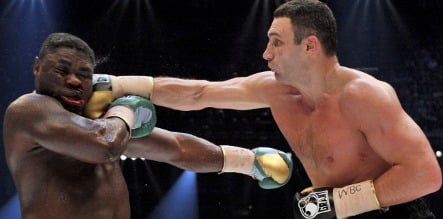The 37-year-old Klitschko – elder brother of IBF, WBO and IBO heavyweight champion Vladimir – added the WBC crown to the family’s collection having last fought in December 2004 before a knee injury led to his temporary retirement.
In his first fight for four years, Klitschko dethroned Nigeria’s Peter who retired at the end of the eighth round to hand Klitschko a technical knock-out and crown him world champion for the third time.
“I knew there was no risk coming back to the ring,” said a delighted Klitschko after the fight in Berlin.
“I worked hard and made my dream a reality.”
And after an emotional celebration with his brother in the Berlin ring, Vladimir said his elder sibling had done the family name proud.
“You proved that you are the better of the Klitschkos, I am proud of you,” he gushed.
Vitali took his first world title against Herbie Hide in 1999 when he won the WBO title which he then lost to Chris Byrd in 2000.
He returned to the ring to win both the WBC and IBO crowns which he then lost to Lennox Lewis in 2003.
Having won back and defended the WBC title against Danny Williams in December 2004, Klitschko was forced to retire until Saturday night’s spectacular return.
Peter, dubbed the ‘Nigerian Nightmare’ with a record of 30 wins and now 2 defeats, managed just one defence of the title he won against Russia’s Oleg Maskaev on March 8 and never threatened Klitschko.
The Nigerian made a good start and caught the Ukrainian on the shoulder in the first round with a heavy shot as he took advantage of Klitschko’s low guard.
But Klitschko, who boasts the highest overall knockout ratio of any heavyweight champion with 36 wins and now 35 knock-outs, caught the Nigerian with several shots to the face in the second.
The Ukrainian was rarely troubled as he constantly landed telling punches while Peter rarely made significant contact, and literally gave in at the end of the eighth round.



 Please whitelist us to continue reading.
Please whitelist us to continue reading.